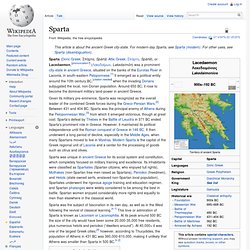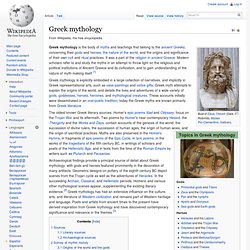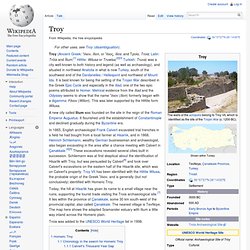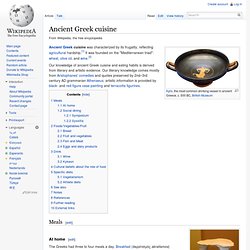

Sparta. Coordinates: Sparta was unique in ancient Greece for its social system and constitution, which completely focused on military training and excellence.

Its inhabitants were classified as Spartiates (Spartan citizens, who enjoyed full rights), Mothakes (non-Spartan free men raised as Spartans), Perioikoi (freedmen), and Helots (state-owned serfs, enslaved non-Spartan local population). Spartiates underwent the rigorous agoge training and education regimen, and Spartan phalanges were widely considered to be among the best in battle. Spartan women enjoyed considerably more rights and equality to men than elsewhere in the classical world.
Sparta was the subject of fascination in its own day, as well as in the West following the revival of classical learning. Names Eurotas River The ancient Greeks used one of three words to refer to the home location of the Spartans. The name of the population was often used for the state of Lacedaemon: the Lacedaemonians. Geography Mythology Thucydides wrote: 'Atlantis' Mythology. Greek mythology.
Greek mythology is explicitly embodied in a large collection of narratives, and implicitly in Greek representational arts, such as vase-paintings and votive gifts.

Greek myth attempts to explain the origins of the world, and details the lives and adventures of a wide variety of gods, goddesses, heroes, heroines, and mythological creatures. These accounts initially were disseminated in an oral-poetic tradition; today the Greek myths are known primarily from Greek literature. Archaeological findings provide a principal source of detail about Greek mythology, with gods and heroes featured prominently in the decoration of many artifacts. Geometric designs on pottery of the eighth century BC depict scenes from the Trojan cycle as well as the adventures of Heracles. Sources Literary sources The poetry of the Hellenistic and Roman ages was primarily composed as a literary rather than cultic exercise.
Archaeological sources Survey of mythic history. Troy. A new city called Ilium was founded on the site in the reign of the Roman Emperor Augustus.

It flourished until the establishment of Constantinople and declined gradually during the Byzantine era. In 1865, English archaeologist Frank Calvert excavated trial trenches in a field he had bought from a local farmer at Hisarlık, and in 1868, Heinrich Schliemann, wealthy German businessman and archaeologist, also began excavating in the area after a chance meeting with Calvert in Çanakkale.[4][5] These excavations revealed several cities built in succession. Schliemann was at first skeptical about the identification of Hisarlik with Troy, but was persuaded by Calvert[6] and took over Calvert's excavations on the eastern half of the Hisarlik site, which was on Calvert's property.
Troy VII has been identified with the Hittite Wilusa, the probable origin of the Greek Ἴλιον, and is generally (but not conclusively) identified with Homeric Troy. Homeric Troy[edit] In November 2001, geologists John C. Greek. Women in Greek Myths. Ancient Greek cuisine. Ancient Greek cuisine was characterized by its frugality, reflecting agricultural hardship.[1] It was founded on the "Mediterranean triad": wheat, olive oil, and wine.[2] Our knowledge of ancient Greek cuisine and eating habits is derived from literary and artistic evidence.

Our literary knowledge comes mostly from Aristophanes' comedies and quotes preserved by 2nd–3rd century AD grammarian Athenaeus; artistic information is provided by black- and red-figure vase-painting and terracotta figurines. Meals[edit] At home[edit] Tagenites were made with wheat flour, olive oil, honey and curdled milk, and were served for breakfast.[9][10][11] Another kind of pancake was σταιτίτης (staititēs), from σταίτινος (staitinos), "of flour or dough of spelt",[12] derived from σταῖς (stais), "flour of spelt".[13] Athenaeus in his Deipnosophistae mentions staititas topped with honey, sesame and cheese.[14][15][16] Social dining[edit] Symposium[edit] Syssitia[edit] Foods/Vegetables/Fruit[edit] Bread[edit]